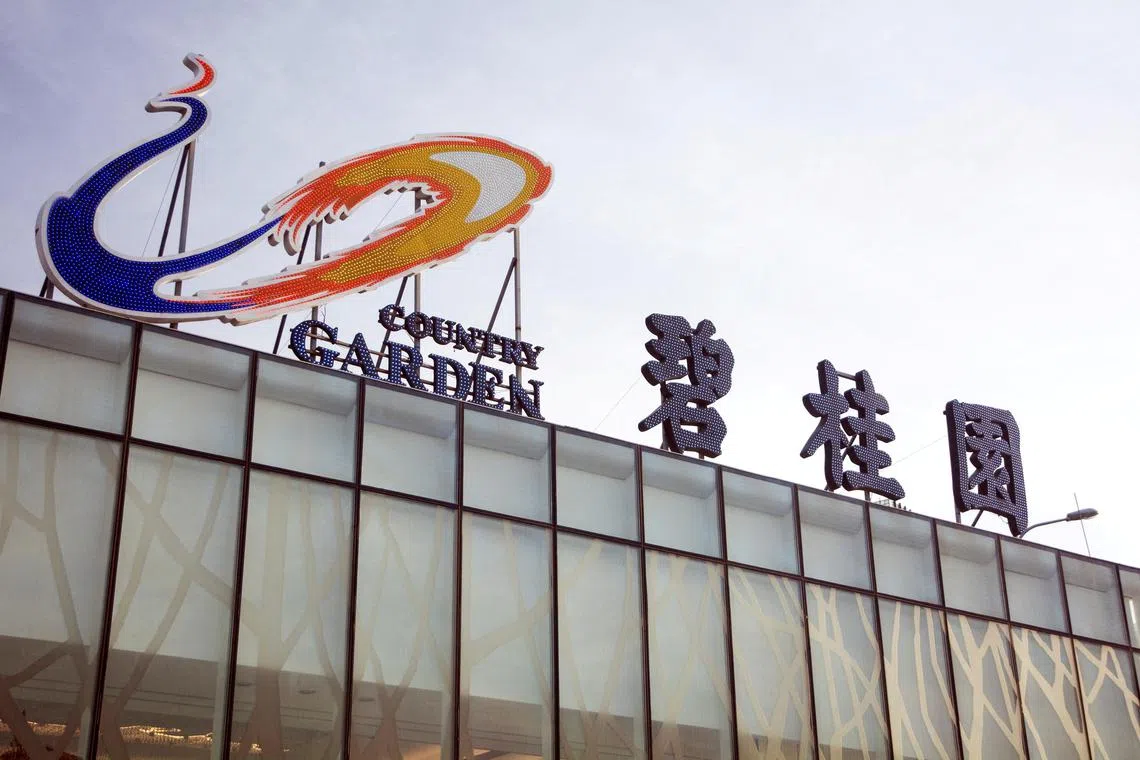Country Garden’s potential $10.3 billion loss fans worst fears over China property market
Sign up now: Get ST's newsletters delivered to your inbox

Country Garden’s financial struggles are confirming investors’ worst fears about the nation’s vast property market.
PHOTO: REUTERS
Follow topic:
SHANGHAI – Less than two years after China Evergrande Group’s default sent shockwaves around the world, an even larger Chinese developer is on the brink.
Country Garden Holdings’ bonds and shares plunged this week after bond holders failed to receive coupon payments by an initial deadline, raising concern it will be the next giant to default.
Late on Thursday, the company revealed the depth of its funding challenges by saying it expects to post a net loss of 45 billion yuan to 55 billion yuan (S$8.4 billion to S$10.3 billion) for the first half of 2023. That compares with earnings of 1.91 billion yuan a year earlier.
On Friday, local media Yicai reported Country Garden is preparing for restructuring and has hired a financial adviser, citing sources.
Country Garden’s financial struggles are confirming investors’ worst fears about the nation’s vast property market, which has resumed a downturn after a brief first-quarter rebound. Home sales tumbled the most in a year in July, making it harder for real estate firms to get cash needed to alleviate the credit crisis.
Failure by Country Garden to pay its debts would pummel fragile investor sentiment just as Beijing seeks to revive the troubled property market.
“Country Garden may have willingness to pay its debts, but it is too cash-strapped,” said Ms Monica Hsiao, founder and chief investment officer of Triada Capital.
“Short of a positive policy surprise, restructuring is likely only a matter of time.”
Investors are pricing in a worst-case scenario. A Country Garden dollar bond due in January fell 14.7 US cents to 8.7 US cents this week, according to data compiled by Bloomberg. In December, it was trading at 75 US cents. The firm’s debt was downgraded three notches to Caa1 from B1 by Moody’s Investors Service on Thursday.
The firm’s shares fell 5.8 per cent to 98 HK cents on Friday, closing below HK$1 for the first time ever. They have tumbled 63 per cent in 2023, the worst performer on Hong Kong’s Hang Seng Index. The firm did not respond to requests for comment by Bloomberg.
Headquartered in the southern city of Foshan in Guangdong province, Country Garden was China’s largest developer by contracted sales from 2017 – when it took the top spot from Evergrande – until 2022. The company dropped to sixth place in 2023 as its sales slumped. The firm focused on building housing developments in lower-tier cities, which have been harder hit by the slowdown than first-tier cities such as Beijing and Shanghai.
“Due to the recent deterioration of sales and refinancing environment, the available funds in the book of the company have been continuously reduced, resulting in a phased liquidity pressure,” Country Garden said in Thursday’s statement.
Total liabilities
Country Garden has the largest pool of outstanding dollar bonds among China’s biggest property firms, excluding defaulters, with some US$9.9 billion (S$13.4 billion) outstanding, Bloomberg-compiled data show. Its total liabilities amounted to 1.4 trillion yuan at the end of 2022. The company will join a slew of defaulters such as Evergrande if it does not make its missed payments within a 30-day grace period.
“Any default would impact China’s housing market more than Evergrande’s collapse as Country Garden has four times as many projects,” Bloomberg Intelligence analyst Kristy Hung wrote in a report on Wednesday.
“Any debt crisis at Country Garden will have a far-reaching impact on China’s housing market sentiment and could significantly weaken buyer confidence on solvent private developers.”
The prolonged slump in China’s property sector has brought previously sound companies to their knees, with firms such as Central China Real Estate, a state-backed developer, repeatedly using grace periods to buy time before stopping payments. In July, creditors of a unit of Dalian Wanda Group and state-backed Sino-Ocean Group Holding received coupons at the last minute.
Revive demand
Regulators across China’s government have been seeking to revive demand in the property industry, which makes up about a fifth of China’s gross domestic product. The sector is caught in a vicious circle where failing developers put home buyers off purchases, which then crimps cash flow of companies.
Last week, the central bank vowed to increase funding support for the private sector. That came after the Communist Party’s Politburo – its top decision-making body – in July signalled a shift towards looser policies for the property market.
“Collapse of another major private developer wouldn’t help with restoring confidence among prospective home buyers,” wrote JPMorgan Chase & Co analyst Frank Pan.
“This could cast more doubts on effectiveness of policy tools to stabilise the housing market. Ultimately, the weaker SOE-backed developers that so far have retained access to unsecured funding onshore could face drags due to the negative backdrop,” the analyst added, referring to developers backed by state-owned enterprises. BLOOMBERG

